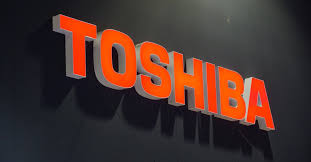
As a result of a majority stake purchase by investors, Toshiba, one of the largest and oldest companies in Japan, is about to terminate its 74-year stock market history. A group led by private equity firm Japan Industrial Partners (JIP) has acquired 78.65% of the company's shares, the company has said.
The group can finalise a $14 billion deal to take the company private since it has more than two thirds of the company. The company's beginnings as a manufacturer of clocks and mechanical toys go back to 1875.
According to the agreement, its shares might be delisted as soon as this year's conclusion.
Taro Shimada, president and chief executive officer of Toshiba, said in a statement that the business "will now take a major step towards a new future with a new shareholder."
As Japan emerged from World War Two (WW2)'s devastation, the Tokyo Stock Exchange reopened in May 1949, and Toshiba's shares began trading.
Its divisions vary from home electronics to nuclear power plants, and it served as a symbol of the nation's economic recovery and technology economy for decades after World War Two.
What Toshiba referred to as "the world's first mass-market laptop computer" was introduced in 1985. 1970 in Kawasaki saw workers from Toshiba Electric inspecting TVs.
However, the Tokyo-based business has recently seen a number of significant setbacks.
"Toshiba's catastrophe is a consequence of inadequate corporate governance at the top," Gerhard Fasol, chief executive of business advisory firm Eurotechnology Japan told the BBC.
It admitted to overstating its profits by more than $1 billion over a six-year period in 2015 and paid a 7.37 billion yen ($47 million; £38 million) fine—at the time, the largest in the nation's history.
Two years later, it disclosed significant losses at Westinghouse, its US nuclear power unit, taking a 700 billion yen writedown.
In order to stay out of bankruptcy, the corporation sold its memory chip division in 2018, which was regarded as the company's crown asset.
Since then, Toshiba has turned down a number of takeover offers, including one in 2021 from the UK private equity firm CVC Capital Partners.
The corporation was discovered to have conspired with the Japanese government that same year to stifle the interests of international investors.
"Toshiba, in the eyes of many Japanese people and especially government, is a national treasure, which is part of the problem," Mr Fasol said.
The corporation then made plans public for its division into three independent firms. The concept was changed a few months later when the board decided to divide the business into two parts.
The business's board stated that it was contemplating JIP's offer to take the company private before the new breakup plan was implemented.
(Source:www.daily-sun.com)
The group can finalise a $14 billion deal to take the company private since it has more than two thirds of the company. The company's beginnings as a manufacturer of clocks and mechanical toys go back to 1875.
According to the agreement, its shares might be delisted as soon as this year's conclusion.
Taro Shimada, president and chief executive officer of Toshiba, said in a statement that the business "will now take a major step towards a new future with a new shareholder."
As Japan emerged from World War Two (WW2)'s devastation, the Tokyo Stock Exchange reopened in May 1949, and Toshiba's shares began trading.
Its divisions vary from home electronics to nuclear power plants, and it served as a symbol of the nation's economic recovery and technology economy for decades after World War Two.
What Toshiba referred to as "the world's first mass-market laptop computer" was introduced in 1985. 1970 in Kawasaki saw workers from Toshiba Electric inspecting TVs.
However, the Tokyo-based business has recently seen a number of significant setbacks.
"Toshiba's catastrophe is a consequence of inadequate corporate governance at the top," Gerhard Fasol, chief executive of business advisory firm Eurotechnology Japan told the BBC.
It admitted to overstating its profits by more than $1 billion over a six-year period in 2015 and paid a 7.37 billion yen ($47 million; £38 million) fine—at the time, the largest in the nation's history.
Two years later, it disclosed significant losses at Westinghouse, its US nuclear power unit, taking a 700 billion yen writedown.
In order to stay out of bankruptcy, the corporation sold its memory chip division in 2018, which was regarded as the company's crown asset.
Since then, Toshiba has turned down a number of takeover offers, including one in 2021 from the UK private equity firm CVC Capital Partners.
The corporation was discovered to have conspired with the Japanese government that same year to stifle the interests of international investors.
"Toshiba, in the eyes of many Japanese people and especially government, is a national treasure, which is part of the problem," Mr Fasol said.
The corporation then made plans public for its division into three independent firms. The concept was changed a few months later when the board decided to divide the business into two parts.
The business's board stated that it was contemplating JIP's offer to take the company private before the new breakup plan was implemented.
(Source:www.daily-sun.com)














